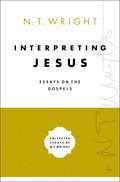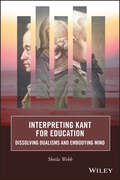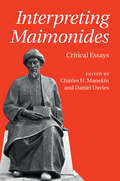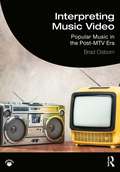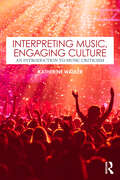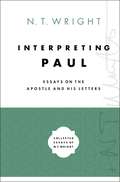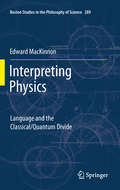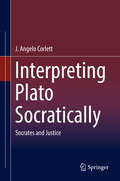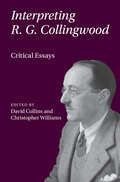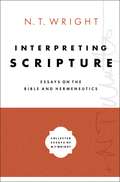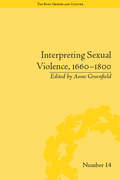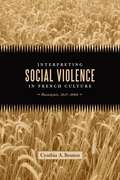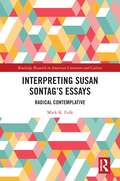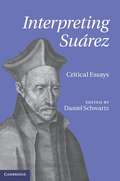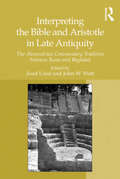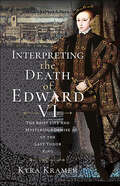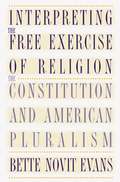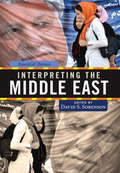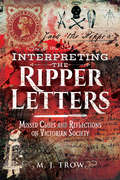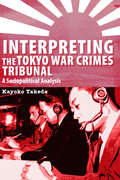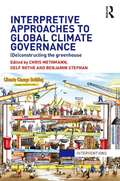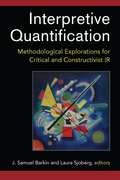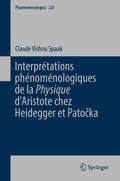- Table View
- List View
Interpreting Jesus: Essays on the Gospels (Collected Essays of N. T. Wright #2)
by N. T. WrightDraws together the most important articles on Jesus and the gospels by distinguished scholar and author N. T. Wright. Interpreting Jesus puts into one volume the development of Wright's thought on this subject over the last three decades. It collects the essays—written for a wide variety of publications—that led up to his groundbreaking book Jesus and the Victory of God, and it includes such wide-ranging themes as:The Biblical Roots of Trinitarian TheologyThe History, Eschatology, and New Creation in John's GospelThe Evangelists' Use of the Old Testament as an Implicit Overarching NarrativeAnd The Public Meaning of the GospelsInterpreting Jesus displays Wright's engaging prose, his courage to go where few have gone, and his joy to bridge the work of the academy and the church.Here is a rich feast for any serious student of the Bible, especially of the New Testament. Detailed, incisive, and exquisitely nuanced exegesis, this collection will reward you with a clearer, deeper, and more informed appreciation of the recent advances in Jesus studies, and their significance for theology today.Many of the included studies have never been published or were made available only in hard-to-find larger volumes and journals.
Interpreting Kant for Education: Dissolving Dualisms and Embodying Mind (Journal of Philosophy of Education)
by Sheila WebbINTERPRETING KANT FOR EDUCATION No thinker in the modern world has laid the way for the development of philosophy so influentially as Immanuel Kant, and it is hard to think of the philosophy of education without some sense of Kant in the background. Yet simplified exegeses and synoptic accounts abound, making for a ‘Kantian’ picture that readily succumbs to caricature. Interpreting Kant for Education exposes the errors in this picture. Through a spiralling series of arguments, Sheila Webb dismantles the sclerotic dualisms of fact and value, subject and object, and body and mind that have done so much to hamper appreciation of Kant and to harm education. This ground-breaking work in the philosophy of education allows a reappraisal of Kant; it plays its part in the reengagement with Kant in the wider analytic tradition and provides a secure footing for better research and practice in education.
Interpreting Maimonides: Critical Essays
by Charles H. Manekin Daniel DaviesMoses Maimonides (1138–1204) was arguably the single most important Jewish thinker of the Middle Ages, with an impact on the later Jewish tradition that was unparalleled by any of his contemporaries. In this volume of new essays, world-leading scholars address themes relevant to his philosophical outlook, including his relationship with his Islamicate surroundings and the impact of his work on subsequent Jewish and Christian writings, as well as his reception in twentieth-century scholarship. The essays also address the nature and aim of Maimonides' philosophical writing, including its connection with biblical exegesis, and the philosophical and theological arguments that are central to his work, such as revelation, ritual, divine providence, and teleology. Wide-ranging and fully up-to-date, the volume will be highly valuable for those interested in Jewish history and thought, medieval philosophy, and religious studies.
Interpreting Music Video: Popular Music in the Post-MTV Era
by Brad OsbornInterpreting Music Video introduces students to the musical, visual, and sociological aspects of music videos, enabling them to critically analyze a multimedia form with a central place in popular culture. With highly relevant examples drawn from recent music videos across many different genres, this concise and accessible book brings together tools from musical analysis, film and media studies, gender and sexuality studies, and critical race studies, requiring no previous knowledge. Exploring the multiple dimensions of music videos, this book is the perfect introduction to critical analysis for music, media studies, communications, and popular culture.
Interpreting Music, Engaging Culture: An Introduction to Music Criticism
by Katherine WalkerInterpreting Music, Engaging Culture: An Introduction to Music Criticism offers a clear, hands-on guide for emerging music critics that brings together aesthetics, critical theory, and practical music criticism in an accessible format. Over the course of the book, readers develop a vocabulary and framework for criticizing music of all kinds and for various media while learning how to connect music to its cultural, social, and political contexts.Excerpts from primary sources throughout provide a wide range of writing examples, while Chapters address the distinct challenges of describing and interpreting music for various media and in diverse formats. Along the way, the book explores questions at the core of music and its criticism, such as what constitutes a musical work and what makes a piece of music “authentic”; it also introduces critical lenses, including feminist and queer criticism, postcolonialism and critical race theory, as well as the analysis of music in consumer culture. Addressing both classical and popular music criticism, Interpreting Music, Engaging Culture is a comprehensive and lively textbook that enables students to uncover, articulate, and analyze what makes music compelling and meaningful.
Interpreting Paul: Essays on the Apostle and His Letters (Collected Essays of N. T. Wright #3)
by N. T. WrightDraws together the most important articles on Paul and his letters by distinguished scholar and author N. T. Wright. Interpreting Paul puts into one volume Wright's most important articles on the Apostle over the last six years. It collects the essays—written for a wide variety of publications—that further his detailed reflections on Paul since the publication of his magisterial Paul and the Faithfulness of God, including such diverse investigations as:How and Why Paul Invented 'Christian Theology'How Greek was Paul's Eschatology?Paul and Missional HermeneuticsThe Challenge of Fraternity in PaulInterpreting Paul displays Wright's engaging prose, his courage to go where few have gone, and his joy to bridge the work of the academy and the church.Here is a rich feast for any serious student of the Bible, especially of the New Testament. Detailed, incisive, and exquisitely nuanced exegesis, this collection will reward you with a clearer, deeper, and more informed appreciation of Paul and the relevance of his teaching to Christian life and thought today.Many of the included studies have never been published or were made available only in hard-to-find larger volumes and journals.
Interpreting Physics
by Edward MackinnonThis book is the first to offer a systematic account of the role of language in the development and interpretation of physics. An historical-conceptual analysis of the co-evolution of mathematical and physical concepts leads to the classical/quatum interface. Bohrian orthodoxy stresses the indispensability of classical concepts and the functional role of mathematics. This book analyses ways of extending, and then going beyond this orthodoxy orthodoxy. Finally, the book analyzes how a revised interpretation of physics impacts on basic philosophical issues: conceptual revolutions, realism, and reductionism.
Interpreting Plato Socratically: Socrates And Justice
by J. Angelo CorlettJ. Angelo Corlett’s new book, Interpreting Plato Socratically continues the critical discussion of the Platonic Question where Corlett’s book, Interpreting Plato’s Dialogues concluded. New arguments in favor of the Mouthpiece Interpretation of Plato’s works are considered and shown to be fallacious, as are new objections to some competing approaches to Plato’s works.The Platonic Question is the problem of how to approach and interpret Plato’s writings most of which are dialogues. How, if at all, can Plato’s beliefs, doctrines, theories and such be extracted from dialogues where there is no direct indication from Plato that his own views are even to be found therein? Most philosophers of Plato attempt to decipher from Plato’s texts seemingly all manner of ideas expressed by Socrates which they then attribute to Plato. They seek to ascribe to Plato particular views about justice, art, love, virtue, knowledge, and the like because, they believe, Socrates is Plato’s mouthpiece through the dialogues. But is such an approach justified? What are the arguments in favor of such an approach? Is there a viable alternative approach to Plato’s dialogues?In this rigorous account of the dominant approach to Plato’s dialogues, there is no room left for reasonable doubt about the problematic reasons given for the notion that Plato’s dialogues reveal either Plato’s or Socrates’ beliefs, doctrines or theories about substantive philosophical matters.Corlett’s approach to Plato’s dialogues is applied to a variety of passages throughout Plato’s works on a wide range of topics concerning justice. In-depth discussions of themes such as legal obligation, punishment and compensatory justice are clarified and with some surprising results. Plato’s works serve as a rich source of philosophical thinking about such matters. A central question in today’s Platonic studies is whether Socrates, or any other protagonist in the dialogues, presents views that the author wanted to assert or defend. Professor Corlett offers a detailed defense of his view that the role of Socrates is to raise questions rather than to provide the author’s answers to them. This defense is timely as intellectual historians consider the part played by Academic scholars centuries after Plato in systematizing Platonism. J. J. Mulhern, University of Pennsylvania
Interpreting Proclus
by Stephen GershThis is the first book to provide an account of the influence of Proclus, a member of the Athenian Neoplatonic School, during more than one thousand years of European history (ca 500-1600). Proclus was the most important philosopher of late antiquity, a dominant (albeit controversial) voice in Byzantine thought, the second most influential Greek philosopher in the later western Middle Ages (after Aristotle), and a major figure (together with Plotinus) in the revival of Greek philosophy in the Renaissance. Proclus was also intensively studied in the Islamic world of the Middle Ages and was a major influence on the thought of medieval Georgia. The volume begins with a substantial essay by the editor summarizing the entire history of Proclus' reception. This is followed by the essays of more than a dozen of the world's leading authorities in the various specific areas covered.
Interpreting R. G. Collingwood: Critical Essays
by David Collins Christopher WilliamsAn indisputably prominent figure in twentieth-century philosophy, R. G. Collingwood often remains elusive even to those who admire his achievements. This volume of new essays aims to reintroduce Collingwood to twenty-first-century philosophical readers and to show why, and how, his achievements matter. Each essay offers an original contribution to the understanding of some aspect of Collingwood's thought, including new interpretations of several of his central ideas, re-examinations of his place in twentieth-century philosophy, and an extended consideration of a previously undiscussed manuscript. The essays span the wide range of Collingwood's interests, including metaphysics, epistemology, logic, philosophy of mind, aesthetics, and political philosophy, as well as Roman British history and the history of art. Emphasis is placed on Collingwood's connections to traditions with which his name is not typically linked, including pragmatism, analytic philosophy, and phenomenology. This rich volume will stimulate further examination of Collingwood and his legacy.
Interpreting Schelling
by Lara OstaricThis book is the first collection of essays on Schelling in English that systematically explores the historical development of his philosophy. It addresses all four periods of Schelling's thought: his Transcendental Philosophy and Philosophy of Nature, his System of Identity [Identitätsphilosophie], his System of Freedom, and his Positive Philosophy. The essays examine the constellation of philosophical ideas that motivated the formation of Schelling's thought, as well as those later ones for which his philosophy laid the foundation. They therefore relate Schelling's philosophy to a broad range of systematic issues that are of importance to us today: metaphysics, epistemology, aesthetics, ethics, our modern conceptions of individual autonomy, philosophy of history, philosophy of religion, political philosophy, and theology. The result is a new interpretation of Schelling's place in the history of German Idealism as an inventive and productive thinker.
Interpreting Scripture: Essays on the Bible and Hermeneutics (Collected Essays of N. T. Wright #1)
by N. T. WrightDraws together the most important articles on Scripture and hermeneutics by distinguished scholar and author N. T. Wright. Interpreting Scripture brings together into one volume Wright's self-selected, key lectures, papers, and reflections on topics of scriptural interpretation, including:The Lord's Prayer as a Paradigm of Christian PrayerChristian Origins and the Question of GodFaith, Virtue, Justification, and the Journey to FreedomRevelation and Christian Hope: Political Implications of the Revelation to JohnApocalyptic and the Sudden Fulfilment of Divine Promise…and many more.Interpreting Scripture displays Wright's engaging prose, his courage to go where few have gone, and his joy to bridge the work of the academy and the church. Here is a rich feast for any serious student of the Bible, especially of the New Testament. Detailed, incisive, and exquisitely nuanced exegesis, this collection will reward you with a clearer, deeper, and more informed appreciation of Scripture and its application to Christian life and thought today.Many of the included studies have never been published or were made available only in hard-to-find larger volumes and journals.
Interpreting Sexual Violence, 1660–1800 ("The Body, Gender and Culture" #14)
by Anne GreenfieldThe essays in this collection explore representations of and responses to sexual violence over the course of the long eighteenth century. Contributors examine the underlying ideologies that spawned these representations, confronting the social, political, legal and aesthetic conditions of the day.
Interpreting Social Violence in French Culture: Buzançais, 1847-2008
by Cynthia A. BoutonIn January 1847, a grain convoy passed through Buzançais, an obscure village in a remote region of central France that was suffering from hunger, high prices, and widespread unemployment. Villagers intercepted the shipment, invaded granaries and mills, and forced resale of the grain at a just price set by the people. What started as a classic subsistence movement, however, triggered two days of rioting and class hostility punctuated by uncommon property damage and death. Disorder soon spread throughout the region. The Buzançais riot quickly became an evocative symbol of the rights of the people, and stories about the riot have survived into the twenty-first century. In Interpreting Social Violence in French Culture, Cynthia A. Bouton traces how the production and marketing of the Buzançais riot story served political commentators, publishers, authors, illustrators, and local enthusiasts, enabling them to draw upon key points from the 1847 uprising to negotiate issues relevant to their own times. Bouton argues that over time, especially from the 1970s, the persistent integration of stories of social protest into a widening variety of media has helped shape French political identity as one in which the politics of the street has become as customary as the politics of political assemblies.Bouton examines representations of the riot in newspapers, novels, illustrations, popular and scholarly historical narratives, cartoons, television, local spectacles, and on the Internet. She analyzes power relations embedded in texts and in images; the ways in which texts and images complement, complicate, and contradict each other; and the ways in which history, memory, and fiction intersect. Both in 1847 and subsequently, she shows, efforts to reorder the disorder at Buzançais have exposed aspects of French social and cultural attitudes and practices. She demonstrates that the particular media employed to tell the Buzançais story both constrained and empowered the messages conveyed by textual and visual narratives of it, perhaps as much as the ideological positions of authors, illustrators, or producers. By probing the relationship between medium and story in relation to the Buzançais riot, Interpreting Social Violence in French Culture offers a new interpretation of this defining moment in French history.
Interpreting Susan Sontag’s Essays: Radical Contemplative (Routledge Research in American Literature and Culture)
by Mark K. FulkInterpreting Susan Sontag’s Essays: Radical Contemplative offers its readers a scholarly examination of her essays within the context of philosophy and aesthetic theory. This study sets up a dialogue between her works and their philosophical counterparts in France and Germany, including the works of Hannah Arendt, Jacques Derrida, Roland Barthes, and Walter Benjamin. Artists and concepts discussed in relation to Sontag’s essays include the works of Andy Warhol, Pop Art, French New Wave Cinema, the music of John Cage, and the cinematic art of Robert Bresson, Leni Riefenstahl, Ingmar Bergman, and Jean-Luc Godard. Her aesthetic formalism is compared with Harold Bloom, and this is the first volume to examine her late works and their position within the American events of 9/11/01 and the War on Terror(ism).
Interpreting Suárez
by Daniel SchwartzFrancisco Suárez is arguably the most important Neo-Scholastic philosopher and a vital link in the chain leading from medieval philosophy to that of the Renaissance and the Enlightenment. Long neglected by the Anglo-Saxon philosophical community, this sixteenth-century Jesuit theologian is now an object of intense scholarly attention. In this volume, Daniel Schwartz brings together essays by leading specialists which provide detailed treatment of some key themes of Francisco Suárez's philosophical work: God, metaphysics, meta-ethics, the human soul, action, ethics and law, justice and war. The authors assess the force of Suárez's arguments, set them within their wider argumentative context and single out influences and appraise competing interpretations. The book is a useful resource for scholars and students of philosophy, theology, philosophy of religion and history of political thought and provides a rich bibliography of secondary literature.
Interpreting the Bible and Aristotle in Late Antiquity: The Alexandrian Commentary Tradition between Rome and Baghdad
by Josef LösslThis book brings together sixteen studies by internationally renowned scholars on the origins and early development of the Latin and Syriac biblical and philosophical commentary traditions. It casts light on the work of the founder of philosophical biblical commentary, Origen of Alexandria, and traces the developments of fourth- and fifth-century Latin commentary techniques in writers such as Marius Victorinus, Jerome and Boethius. The focus then moves east, to the beginnings of Syriac philosophical commentary and its relationship to theology in the works of Sergius of Reshaina, Probus and Paul the Persian, and the influence of this continuing tradition in the East up to the Arabic writings of al-Farabi. There are also chapters on the practice of teaching Aristotelian and Platonic philosophy in fifth-century Alexandria, on contemporaneous developments among Byzantine thinkers, and on the connections in Latin and Syriac traditions between translation (from Greek) and commentary. With its enormous breadth and the groundbreaking originality of its contributions, this volume is an indispensable resource not only for specialists, but also for all students and scholars interested in late-antique intellectual history, especially the practice of teaching and studying philosophy, the philosophical exegesis of the Bible, and the role of commentary in the post-Hellenistic world as far as the classical renaissance in Islam.
Interpreting the Death of Edward VI: The Brief Life and Mysterious Demise of the Last Tudor King
by Kyra KrammerKing Edward VI tends to be glossed over in the historical narrative of the Tudor dynasty. His achievements during his brief time on the throne are eclipsed by the tumultuous and fascinating reigns of his grandfather, father and two half-sisters. This does a great disservice to the precocious and remarkable boy-king. Even with his early death, his effect on English history is undeniable - if he had lived, he would have almost certainly have been considered the greatest of the Tudor monarchs. What killed this impressive young man before he could deepen his mark on history? Moreover, is that medical mystery connected to the premature deaths of the other Tudor male heirs? Interpreting the Death of Edward VI is an exploration into the life, illness and unusually early death of Henry VIII's overshadowed son. The author uses her expertise in Tudor medical history to investigate and provide an in-depth analysis of the prevailing theories of what might have killed the otherwise healthy young Tudor before he reached adulthood.
Interpreting the Free Exercise of Religion
by Bette Novit EvansA generation ago, all of the big questions concerning religious freedom in America seemed to have been resolved. At the very least, the lines of division between proponents of a wall of separation between church and state and advocates of religious accommodation seemed clearly drawn. Since then, increasing religious diversity and changing functions of government have raised new questions about what it means to allow the free exercise of religion. In this book, Bette Novit Evans explores the contemporary understandings of this First Amendment guarantee in all of its complexity and ambiguity. Evans situates constitutional arguments about free exercise within the context of theological and sociological insights about American religious experience. She surveys and evaluates several of the most well considered approaches to religious freedom and applies them to contemporary legal controversies, examining problems in defining religion and claims concerning the autonomy of religious institutions. Her conclusions about religious liberty are embedded in an appreciation of American pluralism: the guarantee of religious freedom, she argues, can be understood as an instrument for fostering alternative sources of meaning within a pluralistic political community.
Interpreting the Middle East: Essential Themes
by David S. SorensonContemporary approaches to comparative studies of the Middle East increasingly recognize how globalization and regional mass communication have blurred differences across countries. <P><P>Populations travel across national borders and compare narratives about political change, economic futures, and the role of the outside world in shaping their lives. Organized by five principal themes of a regional overview, politics, economic development, social context, and international issues, Interpreting the Middle East provides a vibrant introduction to the Middle East that is compatible with this regionalist perspective. Invited authorities contribute insightful and accessible original discussions of central headline-fresh issues such as the aftermath of the Iraq war, Iran's regional ambitions, developments in the Israeli'Palestinian conflict, and the global politics of Middle East oil, gender, and religion. Section introductions by the editor integrate the contributions, and suggested readings, a glossary, and a biographical list of key persons provide helpful guidance for readers.
Interpreting the Ripper Letters: Missed Clues and Reflections on Victorian Society
by M. J. TrowThis true crime history examines the media frenzy surrounding Jack the Ripper—and what the so-called Ripper Letters reveal about Victorian society. In the autumn of 1888, a series of grisly murders took place in Whitechapel in London&’s East End. The Whitechapel murderer, arguably the first of his kind, was never caught, though the police and local press received hundreds of letters claiming to be from the killer. Though most if not all of these letters were hoaxes, they gave rise to the best known pen-name in criminal history: Jack the Ripper. Some letters were taken more seriously than others, while a few—such as the infamous &“Dear Boss&” letter—sent thousands on a hunt to follow its clues. This book is not about the world&’s first serial killer but about the twisted souls who played the part on paper, implicated innocent men, or suggested ever more lurid ways in which he could be caught. For true crime historian M.J. Trow, these letters offer a window into the disturbing shadows of the Victorian mind.
Interpreting the Tokyo War Crimes Tribunal: A Sociopolitical Analysis (Perspectives on Translation)
by Kayoko TakedaIn order to ensure its absolute authority, the Tokyo War Crimes Tribunal (1946–1948), the Japanese counterpart of the Nuremberg Trial, adopted a three-tier structure for its interpreting: Japanese nationals interpreted the proceedings, second-generation Japanese-Americans monitored the interpreting, and Caucasian U.S. military officers arbitrated the disputes. The first extensive study on the subject in English, this book explores the historical and political contexts of the trial as well as the social and cultural backgrounds of the linguists through trial transcripts in English and Japanese, archival documents and recordings, and interviews with those who were involved in the interpreting. In addition to a detailed account of the interpreting, the book examines the reasons for the three-tier system, how the interpreting procedures were established over the course of the trial, and the unique difficulties faced by the Japanese-American monitors. This original case study of the Tokyo War Crimes Tribunal illuminates how complex issues such as trust, power, control and race affect interpreting at international tribunals in times of conflict.
Interpretive Approaches to Global Climate Governance: (De)constructing the Greenhouse (Interventions)
by Delf Rothe Benjamin Stephan Chris MethmannGlobal climate change is perceived to be one of the biggest challenges for international politics in the 21st century. This work seeks to fuse a global governance perspective together with different interpretive approaches, offering a novel way of looking at international climate politics. Equipped with a common interpretive tool-kit, the authors examine different issue-areas and excavate the contours of an overall pattern – the depoliticisation of climate governance. It is this concept which represents the overarching theme connecting the different contributions, addressing issues such as how the securitization of climate change conceals its socio-economic roots; how highly political decisions and value-judgements are couched in the terms of science; how the reframing of climate change as a matter of economic calculation and investment narrows the scope of political action; and how the prevailing concentration on technological solutions to climate change turns it into a mere administrative issue to be tackled by experts. Highlighting the depoliticisation of highly political issues provides a means to bring the political back into one of the most important issue areas of 21st century world politics. The editors have assembled a series of 14 interpretive inquiries into discourses of global climate governance which aim to flesh out an interpretive methodology, demonstrating the value it offers to those seeking to achieve a better understanding of global climate governance. This work will be of great interest to students and scholars of environmental politics, political theory and climate change.
Interpretive Quantification: Methodological Explorations for Critical and Constructivist IR
by J. Samuel Barkin Laura SjobergCountering the growing divide between positivists who embrace quantitative, numerical approaches and post-positivist scholars who favor qualitative, interpretive approaches, J. Samuel Barkin and Laura Sjoberg argue that both methods are more widely adaptable than is commonly assumed by either camp. In Interpretive Quantification, ten highly regarded scholars in the field of International Relations apply quantitative methods and formal models to specific constructivist and critical research questions. In this way, each chapter serves not only as evidence that methods can productively be applied across paradigms, but also as a guide as to how this may be done. In sum, the contributors make a compelling case that when researchers cordon off particular methods for merely ideological reasons, they circumscribe their own paradigms and hinder their own research agenda.
Interprétations phénoménologiques de la 'Physique' d’Aristote chez Heidegger et Patočka (Phaenomenologica #223)
by Claude Vishnu SpaakCet ouvrage met en œuvre une confrontation philosophique entre Heidegger et Patočka, deux figures majeures de la tradition phénoménologique, en prenant pour fil conducteur leurs interprétations respectives des concepts fondamentaux de la Physique d’Aristote. Mais tout d’abord, le point d’accord : l’herméneutique de l’aristotélisme représente aux yeux de Heidegger et de Patočka une première entrée pensante dans l’affaire même de la pensée, où le mouvement (κίνησις/μεταβολή), irréductible au déplacement d’un étant dans l’espace, désigne le procès d’advenue au paraître qui sous-tend l’éclosion à l’être des choses. Aristote met au jour la différence ontologique entre l’être et l’étant, en sorte que la Physique constitue de ce point de vue pour Heidegger et Patočka le véritable Grundbuch de la philosophie occidentale. Cependant, Heidegger et Patočka ne comprennent pas de la même manière le sens de ce mouvement ontologique au cœur de l’être (φύσις). À travers l’examen de ces différences, l’enjeu de cet ouvrage est de mettre en évidence un point de tension au sein de la phénoménologie qui n’a pas encore été suffisamment remarqué, entre d’une part l’approche heideggérienne qui soumet l’être au sens (λόγος), et s’expose de la sorte au risque d’un anthropocentrisme ontologique larvé. Et d’autre part, la tentative d’un réalisme phénoménologique, dont Patočka fut l’un des représentants, dans la double mesure où il brise l’identité classique de l’être et de l’intelligibilité, et où il pense l’homme comme radicalement décentré, prétendant en finir ainsi avec le sujet et tous ses avatars (c’est là le sens de la fameuse « phénoménologie asubjective ») ; réalisme radical dont on peut toutefois se demander s’il ne met pas à mal le paradigme phénoménologique de l’a priori de la corrélation entre l’apparaître et ses modes subjectifs de donnée, et s’il ne remet pas en cause ainsi la possibilité même de la phénoménologie en la poussant au-delà de sa propre limite.
